In the competitive landscape of digital marketing, understanding which campaigns drive valuable customer phone calls is no longer a luxury; it's a necessity. Without clear data, you're essentially guessing where your most qualified leads originate, leading to wasted ad spend and missed opportunities. This is the core problem that the best call tracking software solves: it connects your online and offline marketing efforts to the inbound calls they generate, providing a complete picture of your customer journey and campaign ROI.
This guide is designed to cut through the noise and help you select the right platform for your specific business needs. Whether you're a small business owner aiming to optimize a local Google Ads campaign, a marketing agency managing multiple client accounts, or an enterprise-level call center focused on attribution, the perfect solution is here. We provide a detailed, side-by-side comparison of the top call tracking platforms available today, moving beyond generic feature lists to offer practical insights.
Inside, you'll find an in-depth analysis of 12 leading options, including My AI Front Desk, CallRail, and Invoca. For each platform, we cover:
Each review includes screenshots for a visual reference and direct links to explore further. Our goal is to equip you with the critical information needed to make a confident, informed decision and start attributing revenue to every phone call.
My AI Front Desk emerges as a powerful, AI-driven communications hub that redefines the scope of traditional call tracking. More than just a tool for monitoring call sources, it functions as an intelligent 24/7 receptionist designed to actively engage, qualify, and convert leads across multiple channels. This platform is particularly well-suited for small to medium-sized businesses aiming to maximize every inbound and outbound interaction without dedicating extensive human resources.
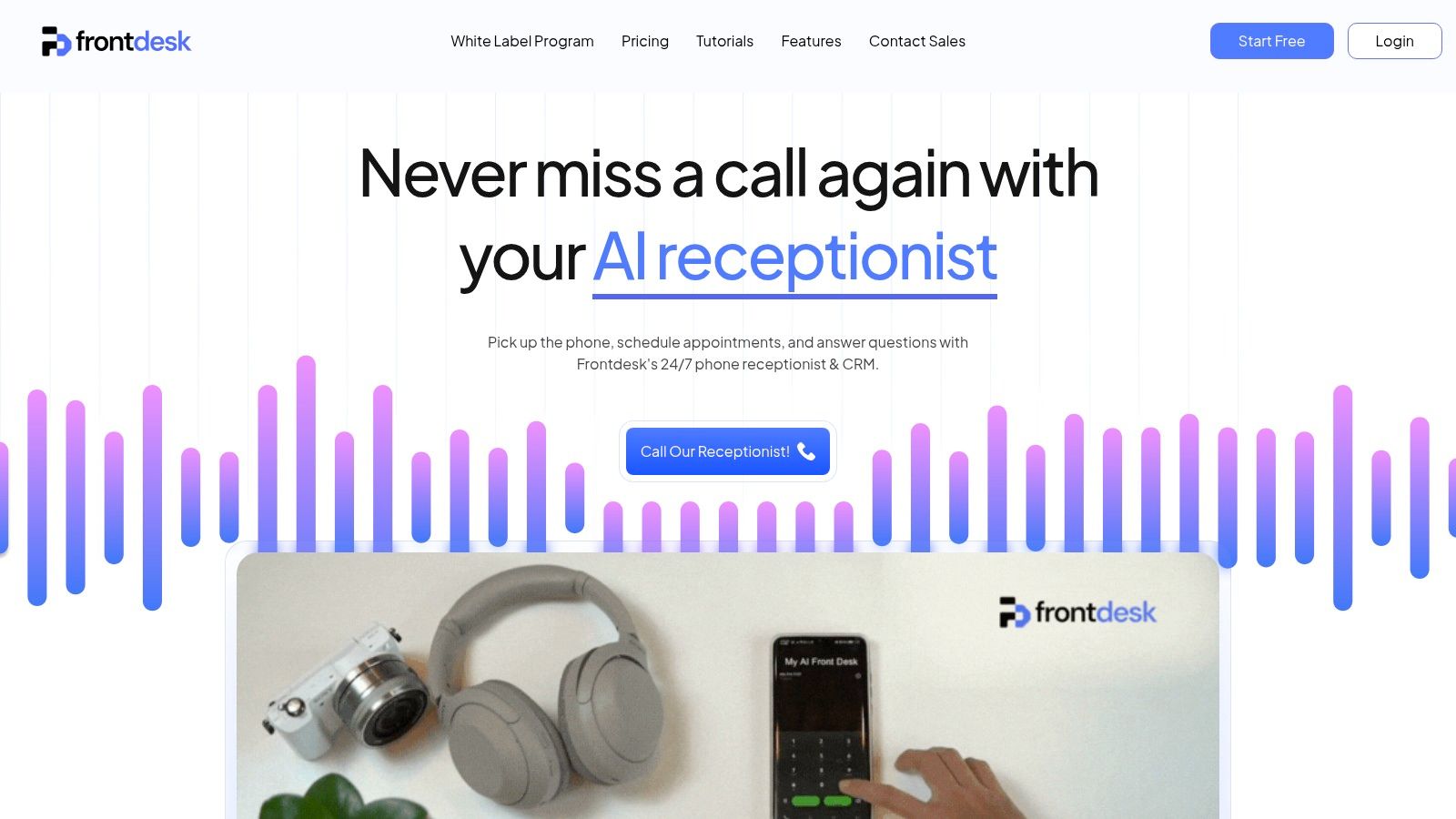
The platform’s core strength lies in its sophisticated AI, which is powered by advanced models like GPT-4 and Claude. This enables remarkably natural, context-aware conversations that can handle complex queries, schedule appointments directly into Google Calendar, and capture critical lead information. It centralizes communications from phone calls, SMS, email, and even WhatsApp, providing a unified view of every customer touchpoint. For businesses looking for the best call tracking software that also automates lead nurturing, My AI Front Desk offers a uniquely comprehensive solution.
My AI Front Desk excels in environments where immediate, intelligent response is critical for capturing leads.
Our Take: My AI Front Desk shifts the paradigm from passive call monitoring to active, AI-powered lead engagement. It’s an exceptional choice for businesses that not only want to know where their calls are coming from but also want to ensure every one of those calls is handled perfectly to maximize conversion potential.
Website: https://myaifrontdesk.com
Pros:
Cons:
CallRail is a dominant force in the call tracking software market, especially for small to medium-sized businesses and marketing agencies. Its strength lies in its user-friendly interface and rapid implementation, allowing marketers to quickly connect inbound calls to specific marketing campaigns, keywords, and ad creatives. This platform makes it simple to prove marketing ROI by clearly attributing phone leads to their source.
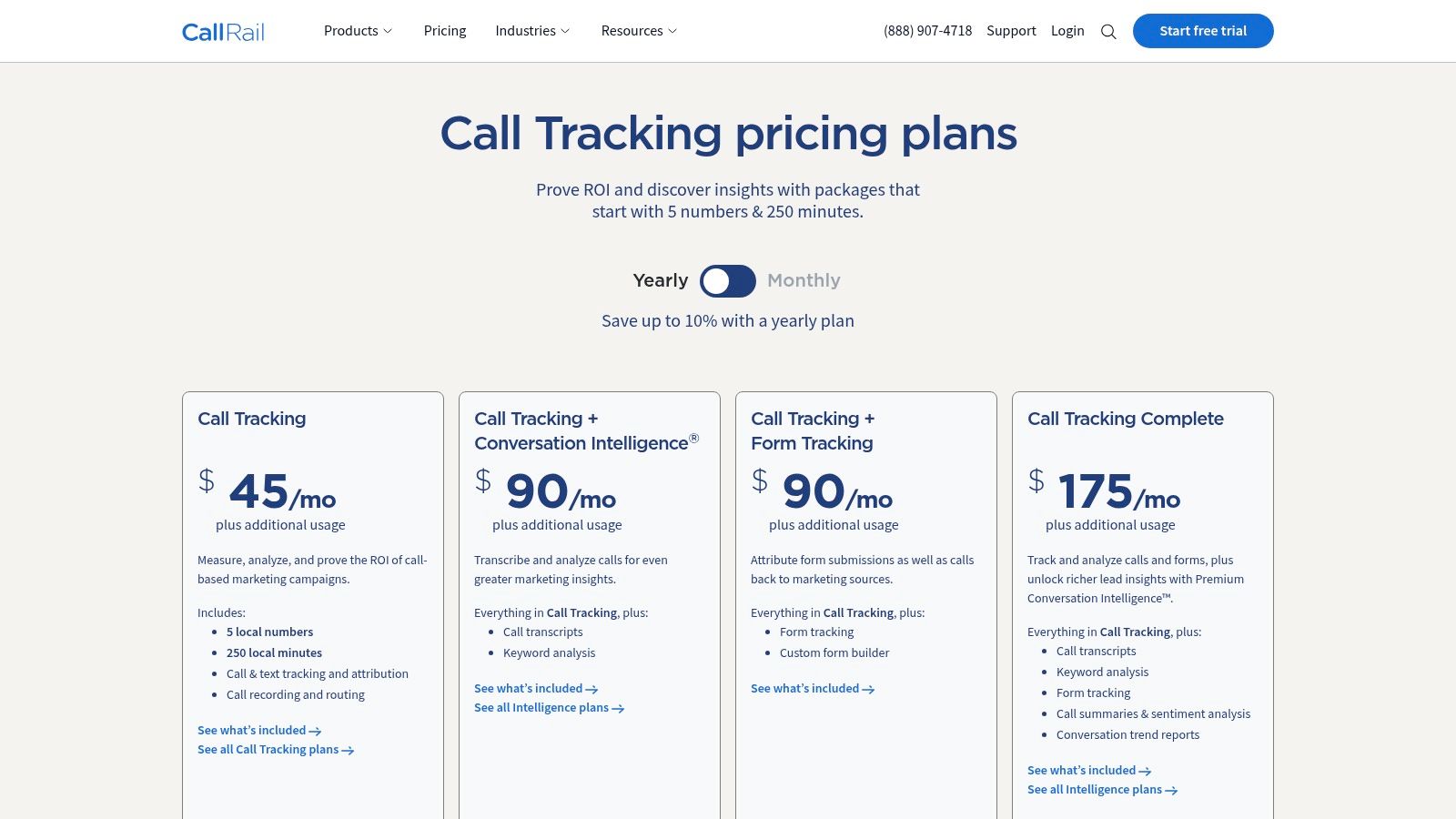
The self-serve signup process and a 14-day free trial (no credit card required) lower the barrier to entry, making it one of the easiest platforms to test. Its dynamic number insertion (DNI) is a core feature, swapping phone numbers on your website based on how a visitor arrived, which is essential for accurate PPC and organic search attribution.
CallRail’s pricing is transparent, starting at $45 per month for the “Call Tracking” plan. This base plan includes DNI, call recording, and basic reporting. For more advanced capabilities, you will need to upgrade.
Best For: SMBs and marketing agencies needing a fast, reliable, and easy-to-use solution to prove marketing ROI without a steep learning curve.
Website: https://www.callrail.com/pricing
CallTrackingMetrics positions itself as a full-stack conversation analytics platform, catering to both sophisticated marketing teams and high-volume contact centers. Its major differentiator is the combination of advanced call attribution with powerful communication tools, supporting unlimited users on all plans. This makes it an ideal choice for organizations needing granular control over call routing, automation, and multi-account management without incurring per-seat licensing fees.
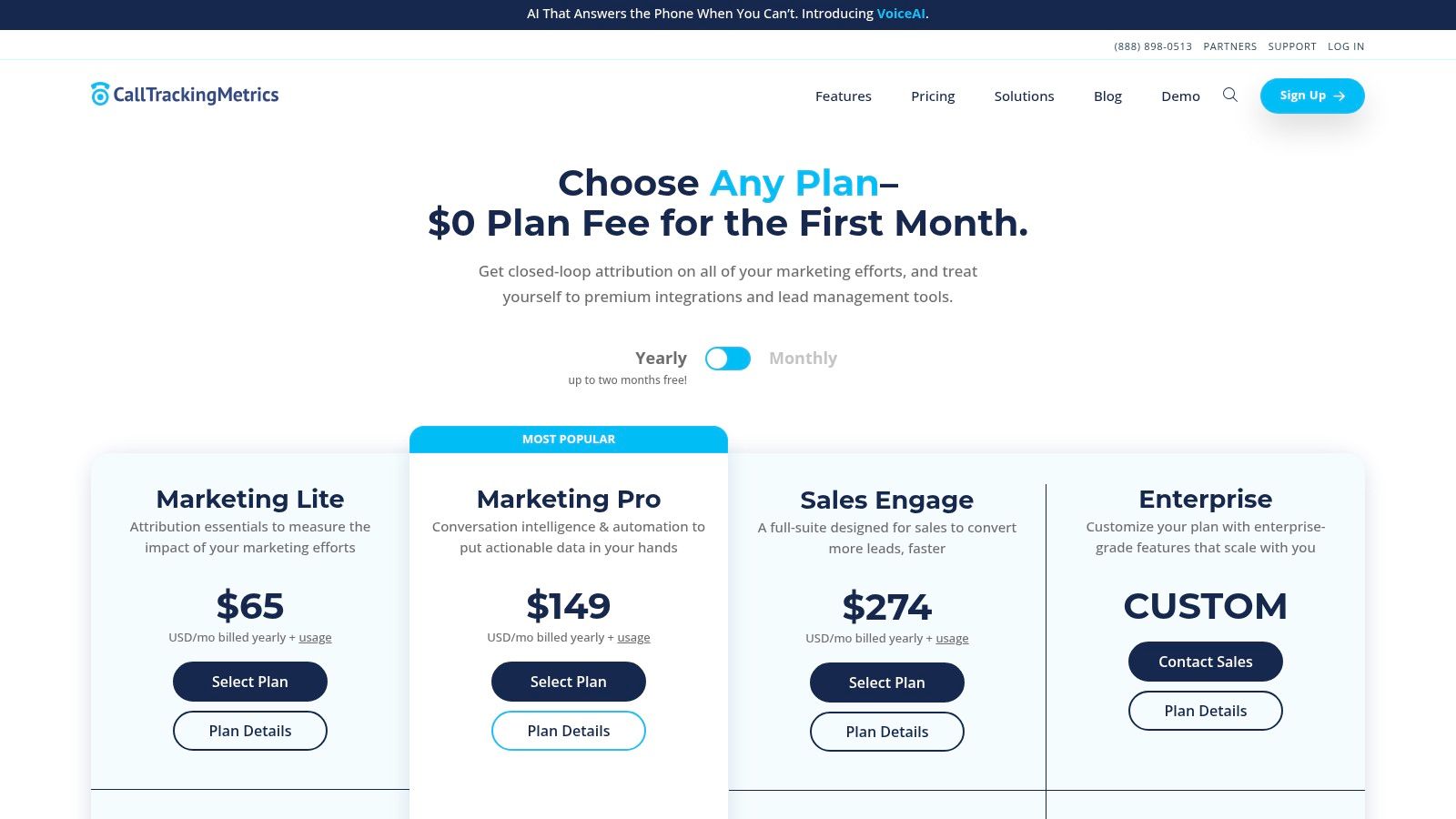
The platform is designed for deep customization, allowing users to build complex call flows and trigger actions in other systems based on conversation data. This focus on automation and integration sets it apart as one of the best call tracking software options for businesses looking to streamline their entire lead management and customer communication workflow, not just attribute calls.
CallTrackingMetrics’ pricing starts with the “Marketing” plan at $39 per month, which focuses on attribution. Usage fees for numbers and minutes are separate, offering a pay-as-you-go model.
Best For: Marketing agencies and enterprise contact centers that require deep customization, powerful automation, and multi-account management capabilities.
Website: https://www.calltrackingmetrics.com/plans-pricing
Invoca is an enterprise-grade conversation intelligence platform that offers some of the most advanced AI-powered call tracking available. It is designed for large performance marketing teams and contact centers that need deep, actionable insights from customer conversations, not just basic attribution data. The platform excels at connecting pre-call digital journey data with in-call conversation outcomes to create a complete customer profile.
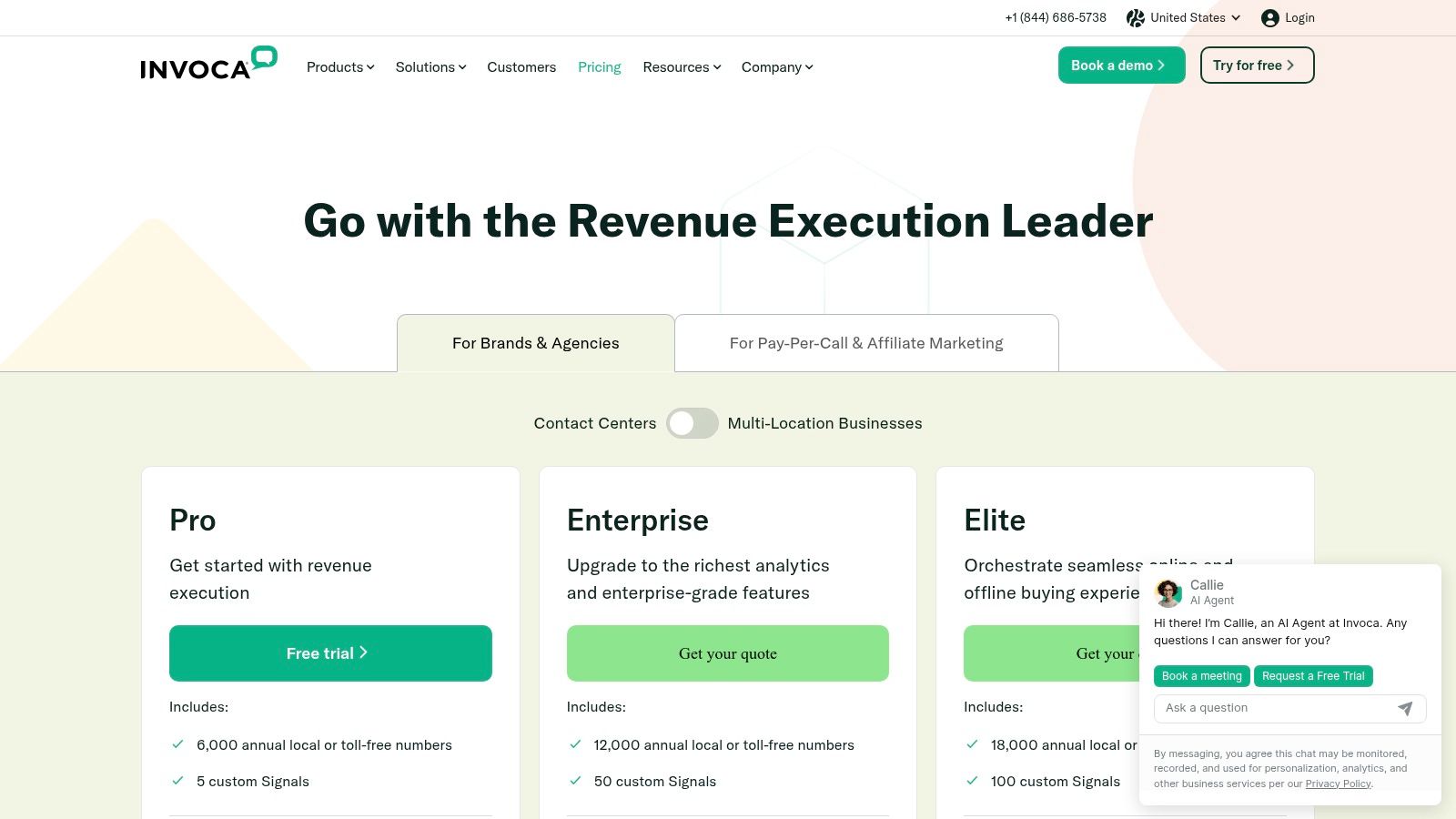
Its core strength lies in its "Signal AI," which analyzes spoken conversations in real time to identify caller intent, conversion events, and customer sentiment. This capability moves beyond simple call tracking and into the realm of comprehensive quality assurance and sales coaching, making it an invaluable tool for optimizing both marketing spend and agent performance.
Invoca's pricing is primarily quote-based, reflecting its focus on customized, enterprise-level solutions. The platform is built to handle high call volumes and complex organizational needs, with features that justify its premium positioning.
Best For: Large enterprises and performance marketing teams that require sophisticated conversation intelligence to optimize high-stakes marketing campaigns and contact center operations.
Website: https://www.invoca.com/pricing
WhatConverts is a comprehensive lead tracking platform that goes beyond simple call attribution, unifying calls, forms, and chat leads into a single dashboard. It's particularly well-suited for businesses and agencies that want to see the full customer journey, tracking leads from the first touchpoint to the final conversion. The platform emphasizes detailed reporting, allowing users to understand which marketing channels drive not just leads, but valuable, quotable leads.
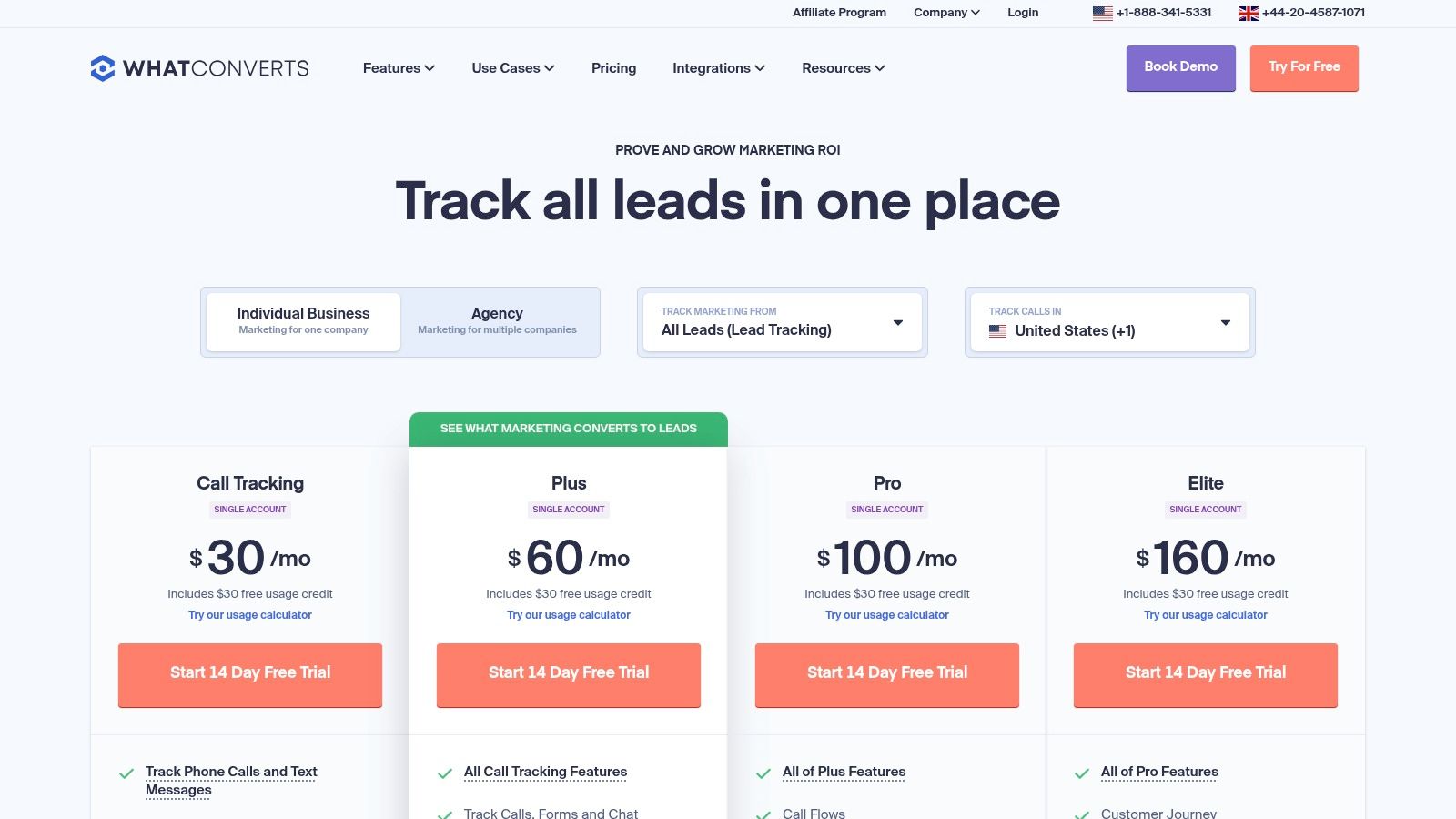
Its strength lies in providing deep marketing data without a high price barrier, making it an excellent choice for those needing more than basic call tracking. The inclusion of usage credits in its plans simplifies billing and provides predictable monthly costs, which is a major benefit for agencies managing multiple client accounts.
WhatConverts offers a "Plus" plan starting at $30 per month, which includes a bundle of local numbers, minutes, and form/chat tracking. This makes it one of the most accessible options for holistic lead tracking.
Best For: Marketing agencies and data-driven businesses that need to track and attribute leads from multiple channels (calls, forms, chat) and understand the full customer journey.
Website: https://www.whatconverts.com/pricing
Ringba is a specialized call tracking platform built for the high-stakes world of performance marketing and pay-per-call networks. It stands out from general-purpose software by offering sophisticated tools for buying, selling, and routing calls in real-time. This platform is engineered for scale, providing the infrastructure needed for lead generation networks, affiliate marketers, and enterprises that treat phone calls as a tradable commodity.
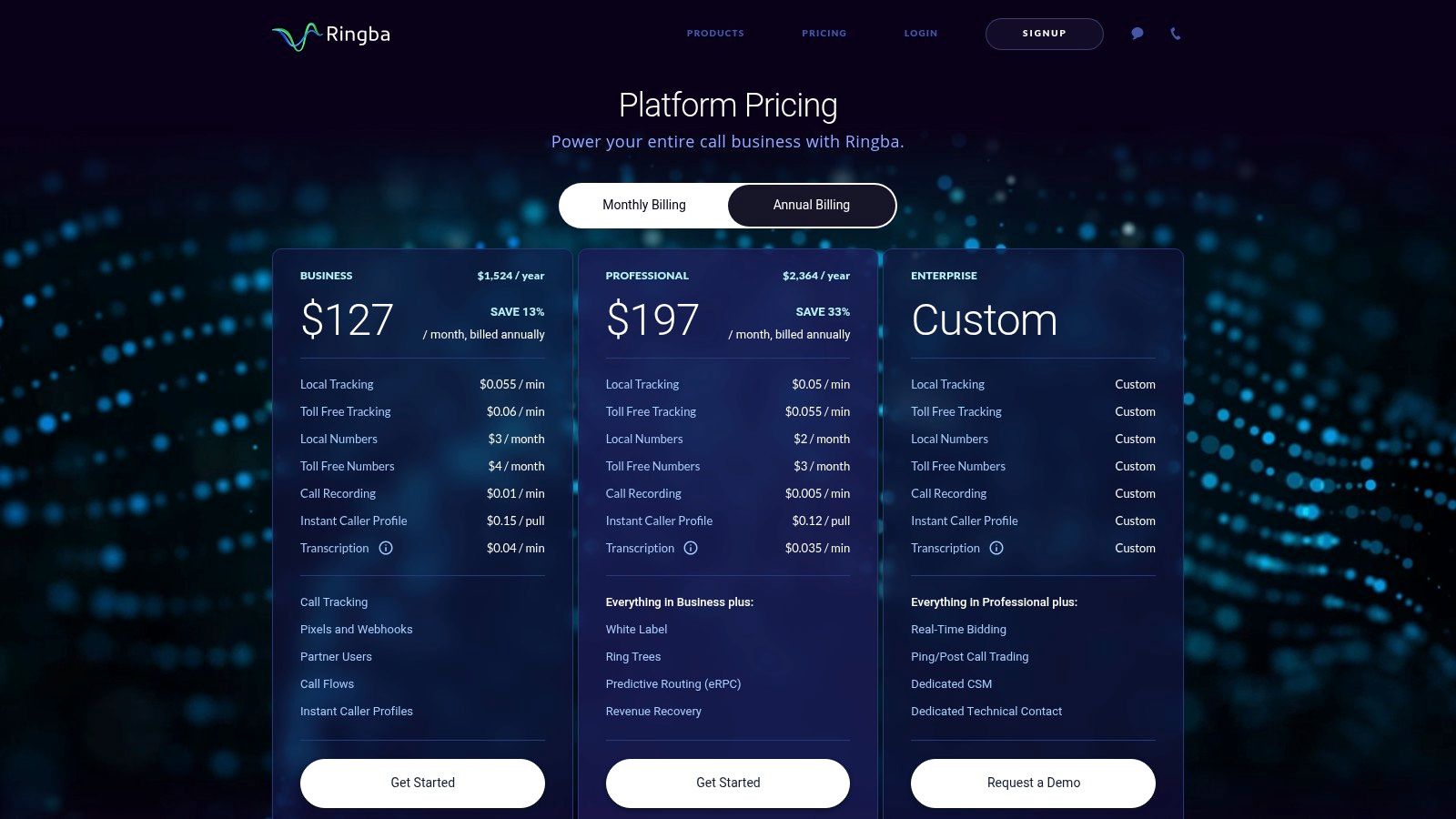
Its core strength lies in its dynamic call routing and marketplace capabilities. Ringba allows users to build complex call flows that can distribute calls to multiple buyers or partners based on hundreds of data points, ensuring maximum profitability for every lead. The platform’s focus on automation and real-time data makes it a powerful engine for pay-per-call campaigns.
Ringba's pricing is usage-based, with a "Pay-as-you-go" model that starts with a $99 monthly platform fee. This includes access to most core features, with additional costs for phone numbers and per-minute usage. More advanced features are available in higher-tier plans.
Best For: Pay-per-call networks, performance marketers, and lead generation agencies that need advanced call routing, marketplace features, and granular control over call distribution at scale.
Website: https://www.ringba.com/pricing
Phonexa positions itself as more than just a call tracking provider; it's a comprehensive performance marketing stack for businesses looking to scale their lead generation and management. Its key differentiator is the suite of integrated products, including lead distribution (LMS Sync), click tracking, email marketing, and analytics, which can be bundled or used modularly. This makes it a strong contender for companies that want a single platform to manage the entire customer journey, from initial click to final conversion.
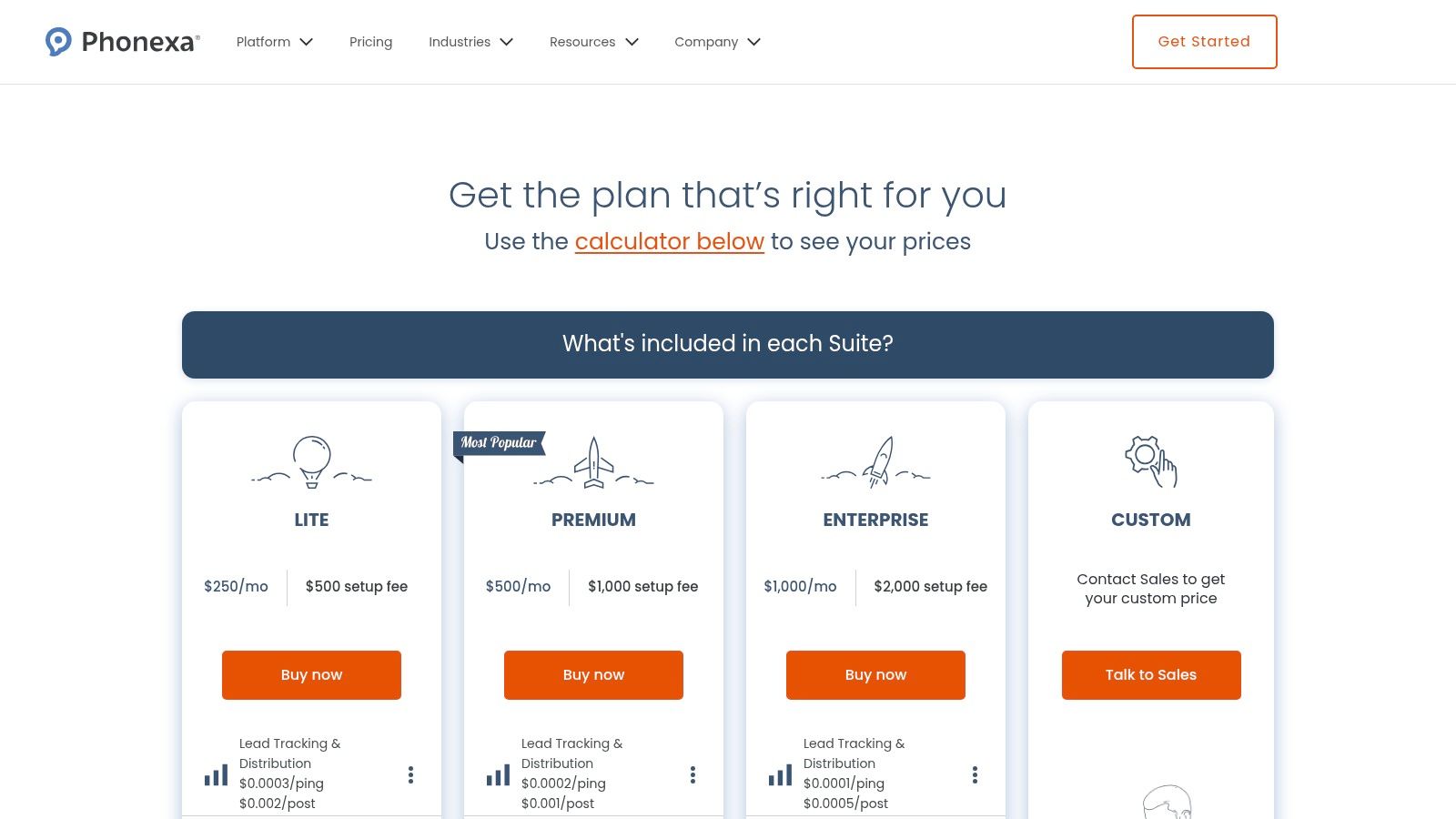
The platform is built for growth, offering everything from standard call tracking and routing to advanced features like a Cloud PBX and behavior analytics. This all-in-one approach appeals to organizations that are outgrowing simpler solutions and need a more unified system to handle complex marketing funnels and high lead volumes. HIPAA-compliant options also make it a viable choice for healthcare-related industries.
Phonexa’s pricing is modular, starting at $100 per month plus usage fees for its Lite Suite. The company provides a detailed pricing calculator on its website for a customized quote, as costs depend on the specific products and volume needed. Setup fees may apply to lower-tier plans.
Best For: Scaling businesses, lead generation companies, and enterprises that need a unified platform to manage complex, multi-channel marketing campaigns beyond just basic call tracking.
Website: https://phonexa.com/pricing/
Infinity is a sophisticated call tracking software geared towards enterprise clients and businesses with complex sales or contact center operations. It excels at providing visitor-level call tracking and deep conversation analytics, connecting every inbound call to its precise user journey. This granular detail allows large teams to optimize campaigns with a high degree of accuracy and integrate phone call data directly into their core business intelligence tools.
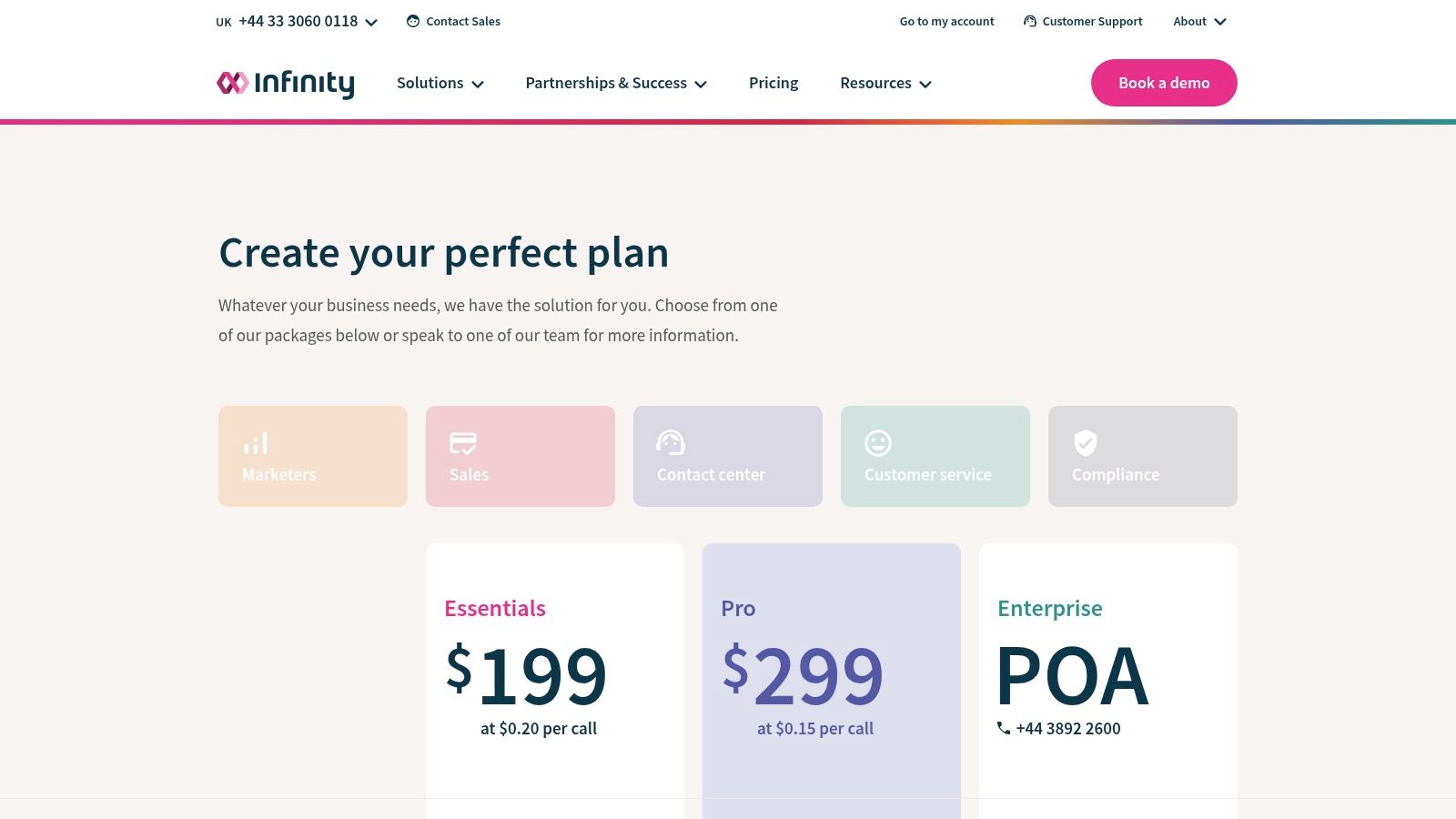
The platform stands out with its robust sales and contact center features, such as advanced dial plans and deep Salesforce integration, which are often critical for larger organizations. Infinity moves beyond basic marketing attribution to provide tools that improve sales performance and operational efficiency, making it a comprehensive solution for data-driven enterprises that rely heavily on phone conversations.
Infinity’s pricing is available upon application, reflecting its tailored, enterprise-focused approach. The platform is built for scalability, offering features that support complex organizational needs.
Best For: Enterprise-level businesses and large contact centers that need deep, visitor-level analytics and advanced sales integrations to manage and optimize high call volumes.
Website: https://www.infinity.co/us/pricing
Twilio is not a traditional call tracking software but a powerful communications API platform that lets you build a completely custom solution. It's the go-to choice for businesses with development resources that need unparalleled flexibility to create a tracking system tailored to their specific workflows. Instead of an out-of-the-box dashboard, Twilio provides the building blocks, like a vast inventory of phone numbers and programmable voice APIs, to construct a system from the ground up.

This approach means you control every aspect of the call flow, from custom IVRs to deep integrations with proprietary CRMs. Its pay-as-you-go pricing model makes it cost-effective at scale, as you only pay for the numbers and minutes you use. This makes it an ideal foundation for businesses that find off-the-shelf solutions too restrictive.
Twilio’s pricing is usage-based, with costs per phone number per month and per minute of call time, offering a low barrier to entry. The platform’s power comes from its programmable features, allowing you to build what you need.
Best For: Tech-savvy companies and enterprises with in-house developers who need a fully customizable and scalable call tracking infrastructure built to their exact specifications.
Website: https://www.twilio.com/en-us/use-cases/call-tracking
Marchex is an enterprise-level call tracking and conversational intelligence platform designed for businesses with high call volumes and complex operational needs. It moves beyond simple attribution to provide deep AI-driven speech analytics, focusing on sales outcomes, missed opportunities, and script compliance. This makes it an ideal solution for multi-location brands and industries like automotive, home services, and healthcare that rely heavily on phone-based sales and support.

The platform's strength is its mature analytics engine, which can automatically score conversations and alert managers to at-risk calls or missed sales opportunities in near real-time. This focus on operational intelligence distinguishes it from many SMB-focused tools, offering a more robust system for improving sales performance and customer experience at scale. Because of its enterprise nature, onboarding typically requires direct engagement with their sales team.
Marchex does not list its pricing publicly, as solutions are typically customized for enterprise clients. The platform is built around delivering actionable business insights from call data rather than just marketing attribution.
Best For: Large, multi-location enterprises and high-volume call centers that need sophisticated conversational AI to improve sales effectiveness and operational efficiency, not just marketing attribution.
Website: https://www.marchex.com/callcap/
While not a call tracking platform itself, G2 is an indispensable market research hub for anyone evaluating software. It offers a comprehensive overview of the call tracking landscape, powered by verified user reviews, detailed feature comparisons, and real-time vendor rankings. This platform empowers buyers to move beyond marketing copy and see how tools perform in real-world scenarios for businesses of a similar size and industry.
G2 is particularly valuable for creating a vendor shortlist. Its methodology for product categorization and transparent review process helps you quickly benchmark different solutions against each other. By filtering for specific segments like enterprise or SMB, you can efficiently identify the frontrunners that meet your core requirements, making it a crucial first step in finding the best call tracking software for your needs.
G2 is free to use for buyers researching software. The platform's business model relies on vendors paying for enhanced profiles and lead generation tools, but the core review data is accessible to all.
Best For: Any business or agency at the start of their buying journey who needs to research, compare, and shortlist potential call tracking vendors based on unbiased, real-world user feedback.
Website: https://www.g2.com/categories/inbound-call-tracking/enterprise
While not a direct provider, Capterra is an indispensable research platform for anyone evaluating the best call tracking software. As a Gartner-owned directory, it offers an extensive collection of software solutions, complete with user reviews, detailed feature lists, and side-by-side comparison tools. It serves as a one-stop-shop for initial research, helping you create a shortlist of potential vendors based on your specific needs.
The platform allows you to filter options by pricing model, business size, key features like dynamic number insertion, and deployment type. This granular filtering is crucial for narrowing down the vast market to find a tool that aligns with your operational requirements and budget. The aggregated user reviews provide real-world insights into usability, customer support, and overall satisfaction.
Capterra is free for users to browse and compare software. The value comes from its comprehensive vendor pages and comparison tools, which help you learn about pricing and features before ever contacting a sales team.
Best For: Businesses in the initial research phase who want to compare a wide range of call tracking software options, read user reviews, and build a shortlist of top contenders.
Website: https://www.capterra.com/call-tracking-software/
Navigating the landscape of call tracking software can feel overwhelming. We've journeyed through a comprehensive list of platforms, from the SMB-friendly appointment scheduling of My AI Front Desk to the enterprise-grade analytics of Invoca and the developer-centric flexibility of Twilio. Each tool presents a unique value proposition, underscoring a crucial truth: the best call tracking software is not a one-size-fits-all solution. It's the one that aligns perfectly with your specific business model, operational needs, and strategic goals.
The core takeaway is that modern call tracking is far more than just counting phone calls. It's about connecting offline conversions to online actions, enriching customer profiles, and unlocking deep, actionable insights into your marketing performance and customer journey. It’s the critical link that proves the ROI of your campaigns and illuminates which channels are truly driving valuable customer interactions.
Our analysis revealed a clear spectrum of solutions. On one end, you have platforms like My AI Front Desk and WhatConverts, which offer exceptional value for small to medium-sized businesses by integrating call tracking with other essential functions like appointment booking and comprehensive lead attribution. They focus on simplifying the complex and delivering immediate, tangible results without a steep learning curve.
In the middle, tools like CallRail and CallTrackingMetrics have established themselves as industry powerhouses. They provide a robust balance of powerful features, extensive integrations, and scalable pricing, making them a reliable choice for growing businesses and marketing agencies that require a versatile and dependable platform.
At the high end, platforms such as Invoca, Phonexa, and Marchex cater to the enterprise market. These solutions deliver sophisticated conversation intelligence, AI-powered analytics, and compliance features designed for large-scale call centers and complex marketing ecosystems. They move beyond simple attribution to analyze the content of conversations, providing unparalleled insights into customer sentiment and agent performance.
Choosing the right tool requires a clear-eyed assessment of your own needs. Before you commit, walk through these critical questions to guide your selection process for the best call tracking software for your team:
What is your primary goal? Are you trying to prove marketing ROI, improve lead quality, enhance customer service, or all of the above? A clear objective will immediately narrow your options. For instance, if your main pain point is missed calls and scheduling bottlenecks, a solution like My AI Front Desk is a natural fit. If it's deep campaign attribution, CallRail or WhatConverts might be your starting point.
What is your technical capacity? Be honest about your team's ability to implement and manage a new platform. Some tools offer a simple, plug-and-play setup, while others, like Twilio, require development resources. Choose a solution that matches your team's technical expertise to ensure successful adoption.
How important are integrations? Your call tracking software should not exist in a silo. Map out your existing tech stack (CRM, Google Analytics, marketing automation platforms) and ensure your chosen provider offers seamless integrations. This is non-negotiable for creating a single, unified view of your customer.
What is your call volume? Pricing models vary significantly. Some charge per minute, others per number, and many offer bundled plans. Estimate your current and projected call volume to accurately forecast costs and avoid unexpected fees as you scale.
Ultimately, the power of call tracking is realized when it moves from a passive data collection tool to an active strategic asset. The data you gather should directly inform your marketing budget allocation, ad copy, keyword strategy, and even your sales training. By connecting calls to customers and campaigns, you’re not just tracking metrics; you’re building a smarter, more responsive, and more profitable business. The right platform is waiting to help you do just that.
Ready to not only track your calls but ensure none are ever missed? My AI Front Desk provides robust call tracking capabilities combined with a 24/7 AI receptionist that can answer calls, book appointments, and take messages. Stop losing leads and start converting more callers by visiting My AI Front Desk to see how our all-in-one solution can transform your customer interactions.
Start your free trial for My AI Front Desk today, it takes minutes to setup!








